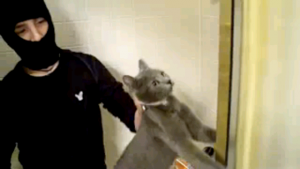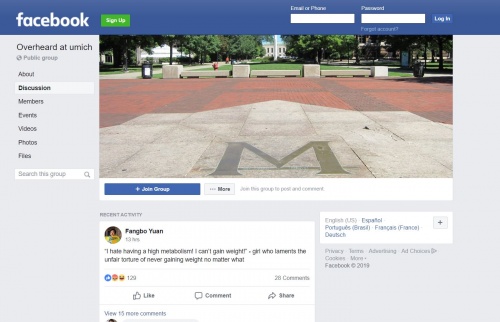Difference between revisions of "Public Morality"
| Line 19: | Line 19: | ||
[[File:Kenny_Glenn.PNG.png|left|300px|thumb|Kenny's brother abusing Dusty the cat]] | [[File:Kenny_Glenn.PNG.png|left|300px|thumb|Kenny's brother abusing Dusty the cat]] | ||
Public morality also applies to the online space. There have been many cases where the online community has acted against perpetrators of immoral acts. In 2009, then 14-year-old Kenny Glenn posted two videos of him and his brother abusing a cat named Dusty. The online community responded by tracking down the creator of the videos and passed his details to the local police department. This resulted in the arrest of a suspect and the cat being taken to a safe place. | Public morality also applies to the online space. There have been many cases where the online community has acted against perpetrators of immoral acts. In 2009, then 14-year-old Kenny Glenn posted two videos of him and his brother abusing a cat named Dusty. The online community responded by tracking down the creator of the videos and passed his details to the local police department. This resulted in the arrest of a suspect and the cat being taken to a safe place. | ||
| + | |||
| + | Reddit, the online community responsible for outing Kenny Glenn for his behavior, play a major part in this online space for public morality. Reddit has thousands of subreddits dedicated to outing certain behavior that go against these norms. Reddit outed major names in online outbreaks like gamergate, and even deals with smaller issues with subreddits in the realm of cheating boyfriends and girlfriends. Reddit, and social media in a sense, is the online hub that people can use to call outrage to people and instances that go against public morality. | ||
| + | |||
Given the prominence of social media in society, public morality offenses have become much easier to be discovered as individuals shift their personal and private lives into the online public sphere. This has raised some ethical issues concerning [[Privacy in the Online Environment | privacy]]. | Given the prominence of social media in society, public morality offenses have become much easier to be discovered as individuals shift their personal and private lives into the online public sphere. This has raised some ethical issues concerning [[Privacy in the Online Environment | privacy]]. | ||
Revision as of 00:53, 3 April 2019
Public morality is the observance and subscription to moral principles and ethical standards which a society enforces by statutory law, police work or social pressure to everyday public life. Activities that are regulated range from behavior of individual citizens in public spaces to content appearing in the media. Typically, regulation includes prohibiting or restricting prostitution, pornography, and other forms of sexual vice, as well as gambling, cruelty to animals, and the use of alcohol and drugs. [1] These behaviors and actions are usually deemed immoral, sinful or degrading, as they contaminate the social well being of society. Public morality limits the behavior of individuals in public places to what is socially acceptable, and is often used to justify censorship. In theocracies, public morality may be equated with religious instruction, where both are given the equal force of law.
Contents
Public Morality and Religion
Public morality is deeply rooted in religion. Philosophers such as John Rawls and Jürgen Habermas have tried to argue that public morality should remain neutral and not deal with religion and other controversial issues, but the two concepts are inseparable as civil law is derived from natural law.[2] George Washington, the first president of the United States, wrote in his Farewell Address:
“Of all the dispositions and habits which lead to political prosperity, religion and morality are indispensable supports… And let us with caution indulge the supposition that morality can be maintained without religion. Whatever may be conceded to the influence of refined education on minds of peculiar structure, reason and experience both forbid us to expect that national morality can prevail in exclusion of religious principle.”[3][4]
Washington said that morality and religion complement each other. He intended for America to be a "Christian nation", and believed that religion provides reasons for convincing citizens that liberal principles are correct. [4] Certain Islamic countries such as Iran, Saudi Arabia and Malaysia have religious police[5] who enforce religious standards in public. Punishable offenses include not abiding by Islamic dress codes, consumption of alcohol and pork, and homosexual behavior.
Public Morality is Dynamic
Views on public morality do change over time. [6] Homosexuality used to be a criminal offense in most countries, and there are still 10 Islamic countries ruled by Sharia law which imposes the death penalty on those charged with homosexuality. It was only at the beginning of the 21st century when countries started legalizing same-sex marriages. Another activity that society has become more tolerant of is pornography. Prior to the Golden Age of Porn,[7] participation in the creation, distribution and consumption of pornography was illegal in most of the United States. Today the porn industry in the U.S. is worth between $10-$12 billion.
Public morality standards vary across cultures and countries, and is similar to social norms. For example, the consumption of alcohol in public is banned in much of the United States, while in countries such as Portugal, Spain, Germany, the United Kingdom, New Zealand, Japan and China, it is legal to do so. Similarly, the recreational use of marijuana has been legalized in Canada and certain states in America, while it remains illegal in the rest of the world.
Public Morality in the Digital Age
Public morality also applies to the online space. There have been many cases where the online community has acted against perpetrators of immoral acts. In 2009, then 14-year-old Kenny Glenn posted two videos of him and his brother abusing a cat named Dusty. The online community responded by tracking down the creator of the videos and passed his details to the local police department. This resulted in the arrest of a suspect and the cat being taken to a safe place.
Reddit, the online community responsible for outing Kenny Glenn for his behavior, play a major part in this online space for public morality. Reddit has thousands of subreddits dedicated to outing certain behavior that go against these norms. Reddit outed major names in online outbreaks like gamergate, and even deals with smaller issues with subreddits in the realm of cheating boyfriends and girlfriends. Reddit, and social media in a sense, is the online hub that people can use to call outrage to people and instances that go against public morality.
Given the prominence of social media in society, public morality offenses have become much easier to be discovered as individuals shift their personal and private lives into the online public sphere. This has raised some ethical issues concerning privacy.
Ethical Concerns
Public Morality and Social Media
There used to be a separation between private and public morality, where private conduct does not affect an individual’s behavior in public roles and vice versa. [8] An individual’s conduct at home, religious affiliation and attitudes towards controversial issues are private moral choices. In contrast, one's conduct outside of the home, be it a student, celebrity or manager of a corporation, is evaluated through the lens of public morality. With the convergence of private and public lives due to social media, one's actions in private will be judged using public morality standards, which leads to punishments in virtual environments. What individuals say to their friends in private might get published on social media by someone who overheard the conversation.[9]
An example of this is the "Overheard at umich" Facebook group[10] where students at the University of Michigan post conversations that they overheard around campus. Some of the more controversial conversations are criticized by group members and can be traced back to the student who said those words. Any student can get into trouble if they are not careful with their words and actions due to the blurring of private and public morality caused by social media.
References
- ↑ George, Robert P. "public morality." The Oxford Companion to Philosophy. : Oxford University Press, January 01, 2005. Oxford Reference. Date Accessed 15 Mar. 2019 <http://www.oxfordreference.com.proxy.lib.umich.edu/view/10.1093/acref/9780199264797.001.0001/acref-9780199264797-e-2086>.
- ↑ Blasi, Fulvio Di. "Public Morality." New Catholic Encyclopedia Supplement 2012-2013: Ethics and Philosophy, edited by Robert L. Fastiggi, vol. 3, Gale, 2013, pp. 1280-1282. Gale Virtual Reference Library, http://link.galegroup.com/apps/doc/CX2762500603/GVRL?u=umuser&sid=GVRL&xid=b99c4392. Accessed 13 Mar. 2019.
- ↑ "Avalon Project - Washington's Farewell Address 1796". Avalon.Law.Yale.Edu, 2019, http://avalon.law.yale.edu/18th_century/washing.asp. Accessed 15 Mar 2019.
- ↑ 4.0 4.1 Galston, William A. “Public Morality and Religion in the Liberal State.” PS, vol. 19, no. 4, 1986, pp. 807–824. JSTOR, www.jstor.org/stable/419315.
- ↑ Sultan, Sohaib (2004). The Koran For Dummies. Hoboken, New Jersey: John Wiley & Sons. pp. 238–40, 246. ISBN 978-0-764-55581-7.
- ↑ Anglim, Christopher, et al. Privacy Rights in the Digital Age, Grey House Publishing, 2016. ProQuest Ebook Central, https://ebookcentral-proquest-com.proxy.lib.umich.edu/lib/umichigan/detail.action?docID=4454671.
- ↑ Paasonen, Susanna; Saarenmaa, Laura (July 19, 2007). The Golden Age of Porn: Nostalgia and History in Cinema (PDF). WordPress. Retrieved April 30, 2017.
- ↑ Smith, Jeffery. "Morality, Public and Private." The SAGE Encyclopedia of Business Ethics and Society. Ed. Robert W. Kolb. Thousand Oaks,: SAGE Publications, Inc., 2018. 2383-2384. SAGE Knowledge. Web. 15 Mar. 2019, doi: 10.4135/9781483381503.n807.
- ↑ Daulerio, A. J. (October 1, 2010). "A Glimpse Into How The Duke Fuck List Went Viral". Deadspin. Archived from the original on 4 October 2010. Retrieved 11 October 2010.
- ↑ https://www.facebook.com/groups/1643645399032633/

